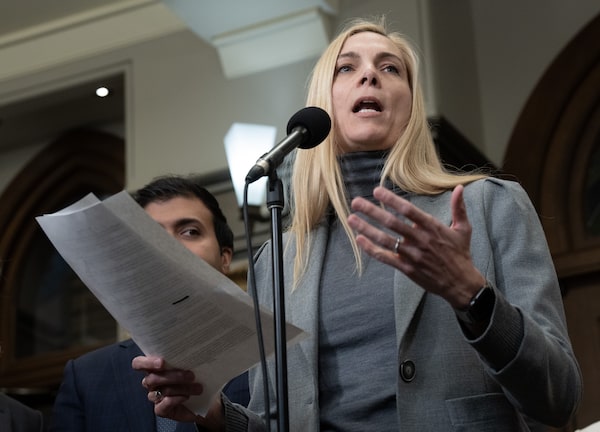
Heritage Minister Pascale St-Onge speaks with reporters in the Foyer of the House of Commons, on Nov. 29 in Ottawa.Adrian Wyld/The Canadian Press
Ottawa is capping broadcasters’ share of the $100-million Google must inject into Canada’s news industry under the Online News Act, to ensure that almost two-thirds of the funds go to written media, including newspapers.
The final regulations to the act will be published by the federal government on Friday, after months of negotiations between Heritage Minister Pascale St-Onge and Google. They set out how the legislation will apply in practice.
The regulations limit the amount of the new funding that private broadcasters will gain. And the CBC’s amount is capped at an even lower threshold.
Google will pay into a “collective,” a type of fund run by news businesses, which will distribute the money. The $100-million figure is far lower than the $172-million originally estimated in draft regulations.
How much money individual news organizations will collect from the deal will depend in part on the number of full-time journalists they employ to produce what the final regulations call “original news content that is intended to be made available online.” This formula could mean less money for small local newspapers, including ethnic outlets, which sometimes have no online presence.
The Online News Act, also known as Bill C-18, gained royal assent in June and goes into effect on Dec. 19. It is designed to support the news industry by requiring large online tech companies to pay Canadian media outlets for posting their journalism. Newsrooms across Canada have shuttered, or shed jobs, as advertising has migrated to tech platforms.
Google and Facebook, the only two online platforms large enough to be captured by the legislation, have resisted the government’s attempts to regulate them under the bill. Meta, the parent company of Facebook and Instagram, has removed news from those platforms in Canada, meaning it is currently exempt from the Online News Act.
At the end of November, Google was on the verge of removing news from its search function when the government came forward with a proposal to address its core concerns about the bill. Late last month, the company agreed to contribute $100-million annually, indexed to inflation.
Because of its size, CBC/Radio Canada initially appeared poised to receive a third of the money from Google. The public broadcaster employs about a third of the journalists in the country.
But when Ms. St-Onge announced the deal with Google earlier this month, she said the CBC’s share of the money would be capped. The government is planning to detail how low the cap will be later on Friday.
In the 2021-22 fiscal year, the CBC received $1.2-billion in government funding. In 2020-21, it received $1.39-billion. It announced earlier this month, after the Google deal was announced, that it would shed about 10 per cent of its work force and reduce production, in an effort to address a budget shortfall of $125-million in the next fiscal year.
Bloc Québécois Leader Yves-François Blanchet said earlier this month that CBC/Radio-Canada should receive none of the Google money – “a huge zero” – so the funds can all go to private media, including outlets in Quebec.
The final regulations also say that “reasonable” administrative costs can be taken out of the Google money to run the collective funding program. This would reduce the overall amount available to news businesses.
The regulations say that “an appropriate portion of the compensation” will be used to support the production of local, regional and national news. Indigenous and francophone news organizations must also receive compensation.
In a statement on Thursday, Google spokesperson Shay Purdy thanked Ms. St-Onge for “engaging in a series of productive meetings” with the company.
“While we remain of the view that Bill C-18 is fundamentally flawed legislation, we are pleased that the Government of Canada has acknowledged our concerns,” he said.
“Fortunately, this means we will be able to continue sending valuable traffic to Canadian publishers and Canadians will be able to continue enjoying the Google products they know and love.”